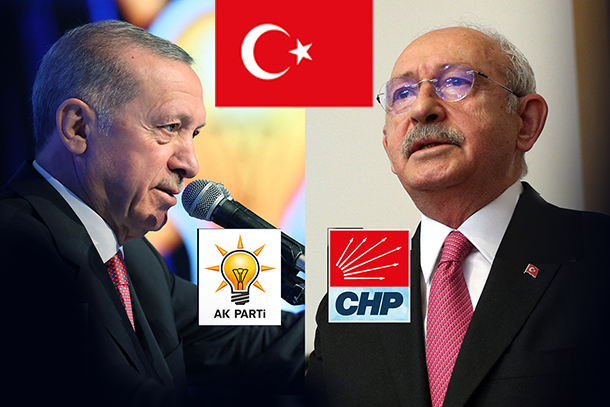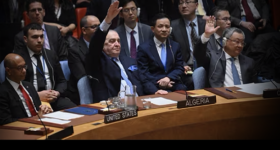The big day is coming, and it’s do or die for the “New Turkey’ project and Erdogan’s AKP legacy.

Dr. Can Erimtan
21st Century Wire
Opponents of the ruling Justice and Development Party (or AKP) see a brand new day ahead, following the May, 14th general elections. But, AKP founder and Turkey‘s incumbent President Recep Tayyip Erdoğan (aka the Prez) fully intends to remain in power and stay put in his ‘humble’ palatial abode at Beştepe in the nation’s capital.
Economic woes, poverty and high unemployment are factors that would seem to indicate that the opposition has a chance of winning this time around. But . . . on the hand, as the saying goes, ‘this is Turkey’ (or burası Türkiye) and the AKP base is large, loyal and decidedly dedicated. And additionally, there are still large swathes of undecided voters and hordes of potential disruptive cats in the wings.
As the saying goes, the outcome is anyone’s guess: will the Prez prevail or will Kemal Kılıçdaroğlu come out on top?!??
#Shariah4Turkey: The Road travelled from 1994 to 2023
At this moment in time, the upcoming elections appear to be nothing but a referendum on the future of the Turkish Republic. Will the population endorse a return to democratic values and a nominal secular system, or, will the people decide that the Kemalist project should be confined to the dustbin of history and the country return to its Ottoman roots, which are enshrined in the Prophet’s example and God’s law – Atatürk or Muhammad, that seems to be the choice.
Last year, I made this programmatic statement regarding the future of Turkey’s democracy and the outcome of the next electoral contest, which has now been placed on May, 14th.:
I have been arguing for nearly a decade now that the AKP “government’s long-term goal (as arguably expressed in the AKP’s policy statement Hedef 2023) is to transform the nation state Turkey into an Anatolian federation of Muslim ethnicities, possibly linked to a revived caliphate” and a possible imposition of Sharia Law.
Throughout its existence, the Republic of Turkey has been an anomaly in the Islamic world – Turks have been dressing in European fashions ever since Sultan Mahmud II (1808-39) abolished Islamic dress codes in 1826; and; they have been writing in a Latin alphabet since 1928. In addition, the nation’s founding father Mustafa Kemal Pasha (later known as Atatürk, 1881-1938) and his Ankara government had already abolished Sharia law in 1926. Love and marriage (and other social relations) in Turkey were instead regulated by the so-called Kanun-ı Medini, itself a copy of the Swiss Code civil. A circumstance which led the emeritus professor of Law and Governance in Developing Countries, Jan Michiel Otto to even speak about “Turkey’s strict secularism” as recently as 2010. Dr Otto even went on to state that “Atatürk turned Turkey into a secular nation after the end of the First World War, and to date it continues to be so.” In reality, the Kemalist Republic wasn’t really a secular state, but rather lenient and permissive regarding certain aspects of social and public life – back in 2011, I published an op-ed explaining my understanding of ‘Turkish Secularism’ under the arguably provocative headline “SECULARISM, BEER AND BIKINIS” (Originally published in the daily Hürriyet Daily News, but following the 2017 referendum all of my contributions to the paper have been scrubbed from the daily’s website).
The current situation in the New Turkey has since then much evolved – this change has come about as a result of decisions taken many years beforehand. As paradoxical as it may sound, in order to ‘protect’ the Republic’s Kemalist principles Turkey’s Armed Forces staged a notorious coup on 12 September 1980 (with the full approval of the U.S. and the CIA, I might add), which all but sealed the fate of the state as a Westward-looking nation. As I have written earlier, the 12 September coup leaders introduced “a new constitution in 1982 and in the present context, this legal document’s 24th article appears particularly poignant. The article starts off with the phrase, ‘Everyone has the right to freedom of conscience, religious belief and conviction,’ but then also contains this section: ‘Education and instruction in religion and ethics shall be conducted under state supervision and control. Instruction in religious culture and moral education shall be compulsory in the curricula of primary and secondary schools’.” The strict introduction of compulsory religious education in Turkish schools was quite revolutionary in a Turkish context. The theologian A. Hadi Adanalı correctly points out that in “1927, all courses concerning religion were excluded from the curriculum of primary, secondary, and high schools on the basis that non-Muslims also live in Turkey. Between the years 1927-1949, no religious instruction was permitted in schools.” With the advent of multi-party democracy in 1950 and the rise to power of the pro-Islamic Democrat Party (DP), “being more sympathetic towards the religious sentiments of society, this new [DP] government introduced a religion course into secondary schools.” These courses however depended upon parental consent. But in 1983, Turkey’s Armed Forces (for, “[t]he army sees itself as the guardian of Turkey’s secularism,” opined the BBC once upon a time) made sure that Turkish pupils and students would again be inculcated with the tenets and principles of the Prophet. And in 1994, 12 years after the new constitution was introduced, the first real fruits of that decision became apparent: Necmettin Erbakan (1926-2011)’s pro-Islamic Refah Partisi (erroneously translated as, Welfare Party) came to national prominence and introduced Recep Tayyip Erdogan to the political stage as Mayor of İstanbul (on 27 March 1994).
About half a year later, the freshly-installed Mayor made a vocal television appearance that left no one in doubt about his ambitions, as I related in great detail in 2016: On 22 November 1994. The well-known journalist and broadcaster Hulki Cevizoğlu was talking to his studio guest, the popular writer and humorist Aziz Nesin (1915-95) about the latter’s reservations regarding Istanbul’s Mayor and the latter’s public attachment to the religion of Islam and the Sharia. And at one point during the broadcast, Recep Tayyip Erdoğan actually joined the conversation via telephone. Tayyip Erdoğan tried to explain himself and clarify his stance. In order to do so, Erdoğan proceeded to quote the 1985 edition of the Turkish translation of the Grand Larousse encyclopédique – one of the great standard works of reference in the pre-internet age Turkey. Specifically, the Mayor recited a passage from volume II, page 762 dealing with Islam, explaining that the religion can be defined as consisting of the Sharia: “Who is a Muslim? Somebody who believes in the religion of Islam. Given that I proclaim, Alḥamdulillāh [or praise be to God or Allah], I am a Muslim, according to this [just-quoted] description [of Islam] I [also] have the right to proclaim, Alḥamdulillāh, I am a proponent of the Sharia.”
It is no coincidence that the 1950 elections that brought the DP to power were held on May, 14th.
Love and Marriage under the Sharia: The Rise and Rise of the Diyanet, 2013-2023
In Kemalist Turkey, the institution of marriage was a civil affair, supervised and controlled by the state. As a result, only official (civil) marriages were legally recognized in Turkey, as defined under the Turkish Civil Code (or Türk Medeni Kanunu, as the Turkified version of the Ottoman-sounding Kanun-ı Medini). Other forms of marriage, without an official marriage ceremony were not recognized in the land and people insisting upon a so-called Dini nikâh or İmam Nikahı (religious marriage ceremonial performed by an imam or person with religious authority) were but married in the eyes of Allah, not the law. As a result, popular lore has it that unmarried individuals willing to engage in presumably illicit sexual relations would oftentimes resort to an İmam Nikahı in order to obtain some sort of imagined legitimacy (unrecognized by the civil authorities). Attentive readers may have noticed my usage of the past tense in the previous paragraph. Recently – as long ago as 2018, in fact – the New Turkey’s Directorate for Religious Affairs (popularly known as the Diyanet) introduced new rules and regulations regarding the institution of marriage and the practice of getting married.
The first occurrence of an official marriage ceremony conducted by a müftü or mufti, which is nothing but a Muslim legal expert empowered to give rulings on religious matters (as pertaining to the Sharia, which in Turkey means an official belonging to the Diyanet) took place in January 2018. Namely the son of the AKP Minister of Defence Nurettin Canikli was married not by a civil servant, but by the Mufti of Ankara, Mehmet Sönmezoğlu. Following the ceremony, the Mufti of İstanbul, Hasan Kamil Yılmaz, made a public statement indicating that marriages conducted by muftis will now take the place of official (resmi) as well as religious (dini) marriages. The İstanbul Müftülüğü (or office of the Mufti of Istanbul) had for that reason already started organizing educational seminaries so that these Diyanet employees would be properly trained and equipped to conduct legally binding marriage ceremonies.
As a result, the institution of marriage has now become a purely Islamic social contract in the New Turkey. This means that, in effect, the Sharia has already re-entered Turkey via the backdoor. At the same time, this new arrangement shows the extent to which the one-time all but ceremonial Directorate for Religious Affairs (or Diyanet) has now become a government body directly affecting people’s daily lives, beyond mere prayer services in the country’s numerous mosques – the Diyanet indicates that it operates a grand total of 89,817 in the whole of the country. The Diyanet‘s budget for the fiscal year 2023 has been estimated to be in the vicinity of ₺36 billion. Ten years ago, the Diyanet received an 18.2% increase in its appropriations – an “appropriation larger than 13 separate ministries.” Over the past ten years, this fiscal strengthening of the Directorate has continued unabated: in comparison, the Ministry of the Interior only received ₺32 billion, Foreign Affairs a measly ₺16 billion and the list goes on . . .as such, the Diyanet‘s budget outstripped that of six individual ministries this year.
In Ottoman times, the state was guided by a veritable triumvirate – the Sultan, the Grand Vezir (or Sadr-ı Azam) and the Sheikh-ul-Islam (or Şeyhülislam). At present, the Turkish Republic’s President is the nation’s sultan and grand vezir (or prime minister) combined, aided by his trusted Director of Religious Affairs, who is nothing less than today’s AKP Sheikh-ul-Islam (a post currently occupied by Ali Erbaş, in office since 2010 when he replaced the more liberal incumbent, Mehmet Nuri Yılmaz). In fact, the Diyanet was established on 3 March 1924 to replace the Ottoman Ministry of Pious Endowments and the office of Şeyhülslam (or Sheikh-ul-Islam or head of the religious institution in the Ottoman State who oversaw the Bâb-ı Meşîhat). As I have explained many months ago, Iran’s Khomeini (1941-1980) seems to provide a plausible explanation for Tayyip Erdoğan‘s desire to establish an executive presidency in the New Turkey. Khomeni put forward that a mere collection of laws is not sufficient to improve society, but that there has to be a strong executive in place to implement the rule of the law and function as society’s guiding light. So that, in the next instance, that strong executive could or would establish the divine law (or Sharia) in the land. In the aftermath of the re-conversion of the Ayasofya Mosque (24 July 2020), the controversial theologian Professor Dr Mehmet Boynukalın tweeted the following message into the world: “Sharia is the name of the divine system drawn by Allah and his prophet for us to follow, bringing goodness, beauty and happiness in this world and in the hereafter. By following the Sharia we founded great empires like Ottoman Empire” (16 Aug 2021). Can it be that the Prez in his pursuit of what I have many years ago termed the AKP policy of Sunnification is now relying on the precepts of a proponent of the Shi’a school of Islam?!?? Is the AKP establishment adhering to the collected writings of a Shi’a cleric published under the heading ‘The Islamic State’?!?
Back to the Future on 14 May 2023?!?
The New Turkey’s upcoming elections have garnered a lot of global attention.
The venerable Economist, for instance, taking a firm stand on the issue: “Could Erdogan be ousted in Turkey’s coming election?” reads the headline of an article published 10 days before Turkey’s elections (4 May 2023). In hopeful, if not outright gleeful tones, the piece states that a “loss for Mr Erdogan would not just be the end of an era.” Quite rightly, the article continues that :[i]t would initiate enormous upheaval in Turkey, with loud reverberations in the region and around the world.” The Economist next even making a clear value judgment, declaring that the country “stands between Europe and the chaos of the Middle East.” In Turkey itself, the controversial Habertürk journalist Nagehan Alçı, for instance, famously says that no one (or rather “no citizen,” as in Turkey, the French Revolutionary custom of referring to individuals as citizens still persists) will accept a “50.2-50.3” percentage outcome and that such indecision could only lead to “mass protests,” adding “[w]homever may win this will be the outcome.” An outcome, Alçı asserts that “[w]ill give rise to an atmosphere of disquiet.” And given that the polarization of the Turkish population has been firm and steadfast for many years now, some may even fear that a loss for the AKP could lead to the eruption of a veritable civil war, thereby turning the country into a carbon copy of its southern neighbour – Syria. Last year, the charlatan that is Cübbeli Ahmet Hoca (aka Ahmet Mahmut Ünlü) warned the Turkish audience that homegrown Salafi groups were being armed from abroad in order to start a “civil war” (‘Selefi Akımların Türkiye’de İç Savaş Çıkartma Tehlikesine Dikkat Çekti’). At the time, these strange words were met with disbelief by the public and members of the press alike. On the other hand, one could argue that Cübbeli issued a veiled warning, given the fact that Salafi movements are virtually non-existent in Turkey. At the time, even the Diyanet felt the need to clarify the situation, informing the press that these allegations were “removed from reality,” without naming any names however.
The New York Times relates that the Prez’s base sees him in the following way: “He is charismatic, a world leader who has strengthened Turkey’s defenses and battled terrorism.” And his base is large, consisting of the previously unseen swathes of pious believers and devout Muslims that inhabit the whole of Turkey. The opposition has now been able to band together, as related by the inimitable Ceyda Karan:
Kemal Kilicdaroglu, meanwhile, is running as the candidate of the “Nation (Millet) Alliance,” which includes the CHP, the Good Party, the Felicity Party (SAADET), the Democratic Party (DP), the Democracy and Progress Party (DEVA) and the Future Party (GP). This electoral alliance is also known as the “Table of Six” coalition.
Similarly, the AKP has also endowed itself with a formidable alliance (‘Cumhur İttifakı’) to counter the six-party opposition (‘Millet İttifakı’). The Prez has allied himself with “the Nationalist Movement Party (MHP), the Grand Unity Party (BBP), the New Welfare Party (YRP) and HUDA-PAR,” as listed by Karan.
The two last parties appear very significant in the present configuration. HÜDA PAR is a Kurdish-Islamist organization that appears to hark back to the terror group Hizbullah (not to confused with the Lebanese Hezbollah, led by Hassan Nasrallah). The Turkish or Kurdish Hizbullah was a “deep state-backed movement that carried out terrorist attacks in the southeast of [Turkey] in the late 1980s and 1990s,” explains Karan. The connection between the political party and the terror group is revealed (or hidden) in the names: Hizbullah obviously means the party of god, in Arabic; and, similarly, the acronym HÜDA PAR could also be read to denote the party of god, given that the word HÜDA is one of Allah’s beautiful names (the acronym supposedly stands for the phrase Hür Dava Partisi or Free Cause Party, with the word dava obviously referring to the cause of Islam). Whereas, the YRP or Yeniden Refah Partisi (or New Welfare Party) is but a re-branding of Necmettin Erbakan’s Refah Partisi (or Welfare party) that brought Tayyip Erdoğan to prominence in 1994. These overtly Islamist parties seem to be but natural supporters of the Prez’s AKP policy of Sunnification that can only lead to the realization of #Shariah4Turkey.
Will Turkey’s eligible voting population of about 60 millions individuals chose for a return to democratic values and a supposedly secular system termed Kemalism or will they opt for a course of steady-as-she-goes, which would herald a return to a life determined by the Prophet’s example and the divine law that is Sharia?!??
Or, put simply, Kemal Kılıçdaroğlu or Tayyip Erdoğan?!??
***
21WIRE special contributor Dr. Can Erimtan is an independent historian and geo-political analyst who used to live in Istanbul. At present, he is in self-imposed exile from Turkey. He has a wide interest in the politics, history and culture of the Balkans, the greater Middle East, and the world beyond. He attended the VUB in Brussels and did his graduate work at the universities of Essex and Oxford. In Oxford, Erimtan was a member of Lady Margaret Hall and he obtained his doctorate in Modern History in 2002. His publications include the revisionist monograph “Ottomans Looking West?” as well as numerous scholarly articles. In Istanbul, Erimtan started publishing in the English language Turkish press, culminating in him becoming the Turkey Editor of the İstanbul Gazette. Subsequently, he commenced writing for RT Op-Edge, NEO, and finally, the 21st Century Wire. You can find him on Twitter at @TheErimtanAngle. Read Can’s archive here.
SEE MORE TURKEY NEWS AT: 21st Century Wire Turkey Files
ALSO JOIN OUR TELEGRAM CHANNEL
PLEASE HELP SUPPORT OUR INDEPENDENT MEDIA PLATFORM HERE
















